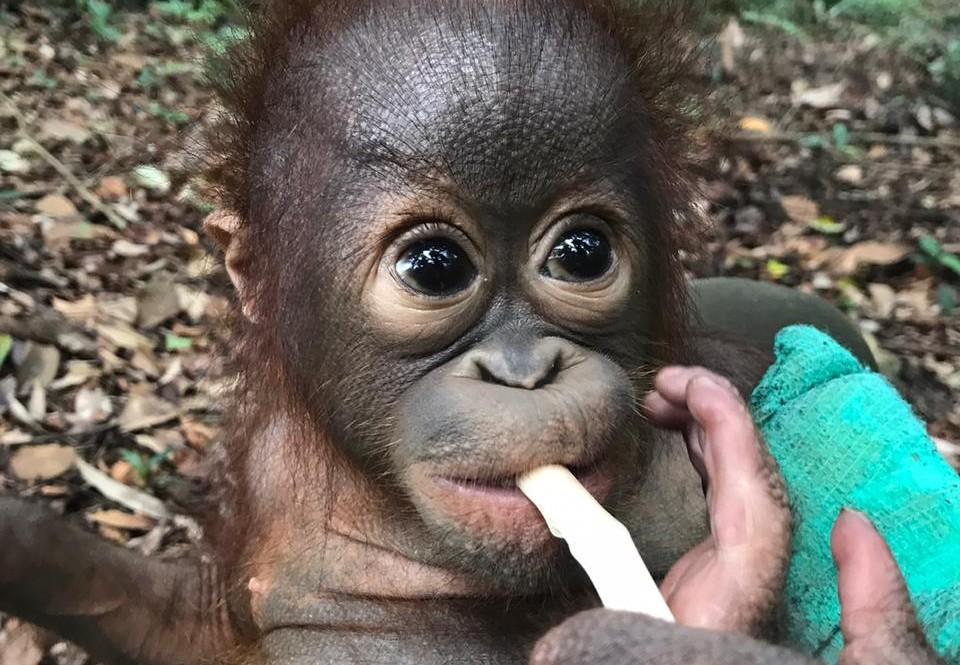
Rescue Orangutan Bhima
With a broken arm and no mother, baby orangutan Bhima needs special care
Baby Bornean orangutan, Bhima, was rescued in October 2020. Together with his mother, he had fallen out of a tree when it crashed down – logged by a worker who had been aware that orangutans were hiding from his chainsaw in the most vulnerable place. While his mother escaped bleeding, baby Bhima had a broken arm and could no longer cling to her body. He was then collected and handed over to the authorities by the very person who caused his tragedy. While COVID prevented our team from going in search of his mother, the felling of trees in the Bengalon area continues to give room to palm oil and coal mining activities.
At just one year old and with such a severe injury, it was heartbreaking to see the suffering he endured. After a week of medical care, the injury got worse when the fractured bone pierced his skin. Such an open fracture is exceedingly dangerous because an infection could quickly become mortal. He underwent emergency surgery to put the bone back into its position. Afterwards, Bhima was under strict supervision by the medical team and caregivers at the ORANGUTAN FOREST SCHOOL's quarantine, which is run in partnership with Jejak Pulang.
Four weeks later, when our investigative team made another attempt to find out more about Bhima’s mother, they were confronted with yet another baby orangutan: Indra. While this fourth orphan of the past year was rescued, the Jejak Pulang investigative team was shown the stem of the tree from which Bhima had fallen and were informed that Indra was picked up by the same loggers. They did not share more information, but we can fill in the blanks.
Being so young, Bhima recovered relatively fast in the 24 hour care of his new human mothers. He loved the regular provision of a milk bottle, but not the pieces of fruit or – worse – vegetables! In the beginning, he would only suck on some melon or banana, yet his condition definitely improved at the ORANGUTAN FOREST SCHOOL. The regular redressing of his injuries and change of bandages was increasingly annoying to him, so that he eventually needed slight sedation for the treatment and the successive x-rays.
Time to heal
Luckily, as Bhima is so young, his bone was mending fast. As his body is still growing, there is a good chance that, with time, no trace of this severe injury will remain. After four months, the casing and bandages were removed and the last x-ray was taken. This showed the previous ends of the fracture well-aligned but also somewhat overlapping. As a result, the formerly broken humerus bone was a centimeter shorter than his right one. But bone will remodel itself under strain and use, esp. in an organism that is still growing.
To Bhima’s own immense relief he was finally allowed to use his arm and climb, dangle, grasp and grapple - like a normal orangutan baby. This wasn't only great for Bhima's wellbeing, but also for building his physical strength and losing some of the surplus weight he had gained.
For further physical rehabilitation, the Jejak Pulang team constructed a special climbing frame that stimulated his orangutan-typical locomotion and thus the use of his arm in a safe and controlled situation. For a few weeks, this helped little Bhima to gain strength and build muscle while exercising his acrobatics and locomotive skills.
Now that Bhima’s arm had mended, introductions to other orangutans could begin! First, he met Indra, who is approximately one year older. After a few day trips to the Forest School, they left the quarantine for good and permanently moved into the Forest School. From that day on they spent the entire daylight time in the forest, exploring trees, lianas and herbs for locomotion and sampling forest foods. At night they still sleep indoors, in the porta camp nursery. Once they were familiar with the forest and the routines, they were permitted to meet two other young orphans who had arrived in the last year at the ORANGUTAN FOREST SCHOOL, Damai and Lestari.
He has a long way to go, but already has come so far from where he started
Bhima still has a long way to go before he can be released back into the wild. In the coming 6 or so years, he needs to perfect all of his locomotion skills. He also needs to learn what to eat. As part of this process, he will learn to recognize at least 200 different types of food trees, how to process his food, when it is ripe, and where he can find it. In addition, he will learn to make a nest and other ways to protect himself from weather and various threats, such as snakes or bears. There are so many things a young orangutan has to learn in order to become an independent and competent ape in the wild!
Even though it is a long journey ahead, Bhima and his friends are now on the right track again to getting there thanks to the help of the Jejak Pulang team, who will be monitoring and supporting him every step of his journey. We are optimistic that one day, we can give him his freedom and return him to the rainforest in his home country of Indonesian Borneo.
Note: Any advertisements that may appear during the viewing of this video are unrelated to FOUR PAWS. We assume no liability for this content.







